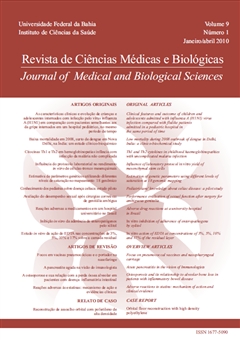Reações adversas às estatinas: mecanismo de ação e evidências clínicas
DOI:
https://doi.org/10.9771/cmbio.v9i1.4645Palabras clave:
Estatinas – Colesterol – Lipoproteínas LDL – CardiopatiasResumen
As doenças cardiovasculares são as maiores causadoras de óbitos no mundo, e o aumento do LDL (lipoproteína de baixadensidade) é apontado como um dos fatores de risco mais importantes para essas doenças. Hoje em dia, as estatinas sãoos fármacos mais potentes e eficazes na diminuição do LDL, mas apesar de seus efeitos potencialmente benéficos, elasdevem ser administradas com precaução, já que também apresentam efeitos colaterais. O objetivo deste trabalho foi fazeruma revisão de literatura que buscasse elucidar os mecanismos dos efeitos adversos causados pelas estatinas e asevidências clínicas destes efeitos. Os mecanismos bioquímicos e celulares da toxicidade muscular, hepática e neuronalestão abordados. Em suma, os efeitos terapêuticos das estatinas, assim como os efeitos adversos, ocorrem devido àinibição da síntese de moléculas dependentes da enzima HMG-CoA-redutase, tais como o mevalonato e isoprenóides. Oreal panorama de ocorrência das reações adversas e uma breve comparação entre as estatinas utilizadas terapeuticamentetambém são apresentados.Descargas
Los datos de descargas todavía no están disponibles.
Descargas
Publicado
2010-10-27
Cómo citar
Santos, L. N., & Silva, F. V. da. (2010). Reações adversas às estatinas: mecanismo de ação e evidências clínicas. Revista De Ciências Médicas E Biológicas, 9(1), 79–86. https://doi.org/10.9771/cmbio.v9i1.4645
Número
Sección
Artigos de revisão
Licencia
A Revista de Ciências Médicas e Biológicas reserva-se todos os direitos autorais dos trabalhos publicados, inclusive de tradução, permitindo, entretanto, a sua posterior reprodução como transcrição, com a devida citação de fonte. O periódico tem acesso livre e gratuito.






